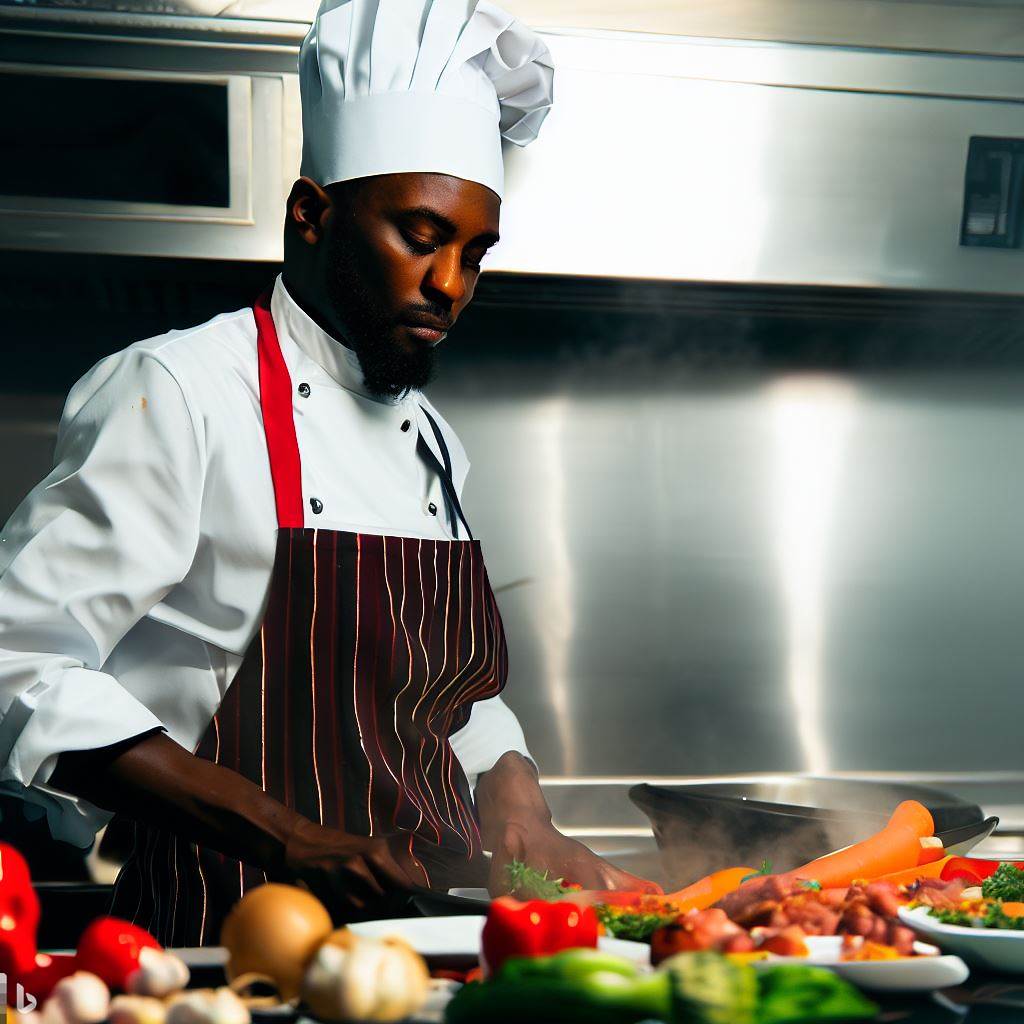Introduction
A day in the life of a professional Nigerian chef is a fascinating and demanding experience. Understanding their role is important as they play a vital role in Nigerian cuisine.
In this blog section, we will explore what it takes to be a professional Nigerian chef and the challenges they face in their daily life.
A. Importance of understanding the role of a professional Nigerian chef
Being a professional Nigerian chef requires passion, expertise, and dedication to the art of cooking.
These culinary artists are responsible for creating authentic Nigerian dishes that delight the taste buds of their patrons.
Through their skills and creativity, they keep the rich heritage and flavors of Nigerian cuisine alive.
To truly appreciate the efforts and exertions of a professional Nigerian chef, it is crucial to understand the importance of their role.
These chefs not only bring joy to people’s lives through their delicious creations but also contribute to the cultural preservation and promotion of Nigerian gastronomy.
B. Preview of the content
In the following sections, we will delve into the typical day of a professional Nigerian chef, starting with the early morning preparations and the crucial role they play in menu planning.
We will also explore the challenges they face, such as sourcing authentic ingredients and maintaining the highest standards of hygiene and food safety.
Furthermore, we will discuss the skills and qualifications required to become a successful professional Nigerian chef and the continuous learning and innovation necessary to excel in this competitive industry.
So join us on this culinary journey as we uncover the intricacies, triumphs, and trials faced by these talented individuals who bring the flavors of Nigeria to life on our plates.
Background on Nigerian Cuisine
A. Definition and characteristics of Nigerian cuisine
Nigerian cuisine refers to the traditional food of Nigeria, a country located in West Africa.
It is a fusion of various regional dishes, influenced by the rich cultural heritage of the country. Nigerian cuisine is known for its diverse flavors, vibrant colors, and bold spices.
B. Popular dishes and ingredients
- Jollof Rice: This is a popular Nigerian dish made with rice cooked in a flavorful tomato sauce.
It is often served with fried plantains and a variety of protein options such as chicken, beef, or fish. - Egusi Soup: This is a delicious Nigerian soup made with ground melon seeds, vegetables, and various spices.
It is commonly paired with pounded yam or fufu, which are staple carbohydrate foods in Nigeria. - Suya: Suya is a popular Nigerian street food made from skewered and grilled meat, typically beef or chicken.
It is coated with a special spice mix that gives it a unique and smoky flavor. - Pounded Yam: Pounded yam is a starchy Nigerian food made by boiling yam and pounding it until it becomes a smooth and elastic dough-like consistency.
It is often eaten with various soups and stews. - Moi Moi: Moi Moi is a savory Nigerian dish made from blended black-eyed peas, onions, peppers, and spices.
It is typically steamed and served as a side dish or snack.
C. Cultural significance of Nigerian food
Nigerian food plays a significant role in the country’s culture and social gatherings.
It is often used to celebrate special occasions such as weddings, birthdays, and festivals.
Sharing a meal is considered an important social activity, fostering a sense of community and togetherness.
Furthermore, Nigerian cuisine reflects the country’s rich cultural diversity. Nigeria is made up of various ethnic groups, each with its own distinct culinary traditions.
The preparation and consumption of food in Nigeria serve as a way to preserve and showcase these cultural differences.
Nigerian food also has economic significance, as agriculture is a major sector in the country.
Many ingredients used in Nigerian cuisine, such as yam, cassava, and palm oil, are locally sourced, supporting the livelihoods of farmers and promoting self-sufficiency.
Nigerian cuisine encompasses a wide variety of dishes that are characterized by their bold flavors, vibrant colors, and diverse ingredients.
The cultural significance of Nigerian food is evident in its role in social gatherings, preservation of cultural traditions, and economic importance.
Exploring Nigerian cuisine is not only a culinary adventure but also a journey into the heart and soul of Nigeria’s rich cultural heritage.
Becoming a Professional Nigerian Chef
A career as a professional Nigerian chef requires a combination of education, training, specific skills, and qualities.
Let’s delve into the details of what it takes to become a successful chef in Nigeria.
A. Education and Training Required
- Formal culinary education is not always mandatory, but it can greatly enhance your career prospects.
- Attending a reputable culinary school or taking up courses in hospitality and food management is beneficial.
- Hands-on training through apprenticeships or working in professional kitchens is also invaluable.
- Learning traditional Nigerian cooking techniques and ingredients is crucial for mastering Nigerian cuisine.
- Continuous learning and staying updated with new cooking trends is essential for professional growth.
B. Skills and Qualities Needed
- A professional Nigerian chef must have excellent cooking skills and a deep understanding of flavors.
- Attention to detail is crucial to ensure that every dish is well-executed and presented beautifully.
- Good organizational skills help in handling multiple tasks simultaneously, especially during busy service hours.
- Creativity and the ability to experiment with flavors and techniques are important for innovation.
- Teamwork and effective communication skills are necessary for a harmonious kitchen environment.
- Patience and the ability to work under pressure help in dealing with challenging situations.
- A passionate and adventurous palate enables chefs to create unique and exciting dishes.
C. Opportunities and Challenges in the Culinary Industry in Nigeria
- The culinary industry in Nigeria is booming, providing numerous opportunities for professional chefs.
- As the Nigerian middle class grows, there is an increasing demand for fine dining experiences and unique cuisines.
- Working in top-notch hotels, restaurants, catering companies, and private events can offer exposure and growth.
- However, competition is fierce, and chefs must constantly innovate to stay ahead and meet customer demands.
- Inadequate infrastructure, inconsistent power supply, and availability of quality ingredients pose challenges.
- To overcome these challenges, chefs need to be adaptable, resourceful, and have strong problem-solving skills.
- Networking, participating in culinary competitions, and showcasing their skills on social media can enhance visibility.
becoming a professional Nigerian chef requires a combination of education, hands-on training, specific skills, and qualities.
With a passion for cooking, continuous learning, and perseverance, aspiring chefs can carve a successful and fulfilling career in the culinary industry in Nigeria.
A Typical Morning Routine
A professional Nigerian chef’s day begins bright and early at the crack of dawn.
A. Waking up early
The alarm clock buzzes, jolting the chef out of a deep slumber. With a yawn, the chef wipes away the sleep from their eyes and stretches their limbs.
A hot shower invigorates their senses, ridding them of any residual drowsiness. Dressed in clean, crisp chef whites, the chef is ready to tackle the day.
Mornings play a crucial part in a professional Nigerian chef’s routine. Waking up early allows them the time to make necessary preparations and get into the right frame of mind.
The chef understands the importance of being well-rested and refreshed before starting a day filled with culinary adventures.
B. Preparing for the day ahead
A quick glance at the day’s schedule is essential to ensure everything runs smoothly.
The chef meticulously plans each dish, taking into account the specific requirements and timing.
They pay heed to details, striving for excellence in every element of the meal they are about to create.
C. Checking and organizing ingredients and supplies
The chef inspects the freshness of the ingredients stored in the kitchen.
They make a mental note of any supplies that need restocking or replenishing.
Organizing the ingredients in order of use helps streamline the cooking process.
With everything in place, the chef takes a deep breath and starts the day’s culinary journey.
Read: Online Customer Service Tools: Adoption in Nigeria’s Market
Food Preparation and Cooking Techniques
Food preparation and cooking techniques involve various processes and methods for creating delicious dishes.
These methods include chopping, slicing, and dicing ingredients, marinating meats, and selecting fresh produce.
Additionally, it entails seasoning dishes with herbs and spices, as well as using cooking utensils like pots, pans, and knives efficiently.
Proper food handling, such as washing hands and utensils, is crucial for food safety.
Next, heating methods like baking, grilling, or frying transform raw ingredients into cooked, ready-to-eat meals.
Roasting, sautéing, and simmering enhance flavors, while techniques like blanching and braising ensure food is tender and well-cooked.
Furthermore, culinary arts require creativity in combining ingredients to create unique flavors and textures.
Understanding the principles of flavor balance, like sweet and salty or sour and bitter, is essential.
Furthermore, cooking temperatures, timing, and precision play pivotal roles in achieving desired outcomes.
Food preparation and cooking techniques encompass a wide array of methods and practices that transform raw ingredients into delightful culinary creations.
It requires skill, knowledge, and creativity to excel in the culinary world.
A. Importance of fresh ingredients and proper techniques
- Fresh ingredients are crucial for a Nigerian chef as they enhance the flavor and quality of the dish.
- Using proper techniques ensures that the ingredients are cooked correctly and retain their nutritional value.
- Fresh ingredients and proper techniques contribute to the overall success of a dish, making it delicious and satisfying.
B. Traditional Nigerian cooking methods
- Nigerian cuisine is known for its rich and diverse cooking methods that have been passed down through generations.
- Steaming is a commonly used traditional cooking method in Nigerian cuisine to preserve the flavors and nutrients of the ingredients.
- Grilling and roasting are also popular cooking methods used to create smoky and charred flavors in Nigerian dishes.
- Other traditional cooking methods include frying, boiling, and stewing, which are all utilized to create unique dishes.
C. Incorporating modern trends and techniques
- Nigerian chefs are increasingly incorporating modern trends and techniques into their cooking to create innovative dishes.
- Sous vide cooking, which involves vacuum-sealing ingredients and cooking them in a water bath at a precise temperature, is gaining popularity among Nigerian chefs.
- Molecular gastronomy techniques like foams and gels are also being embraced by Nigerian chefs to add a modern touch to traditional dishes.
- Fusion cuisine, combining Nigerian flavors with international influences, is another way chefs are staying on-trend and appealing to a diverse audience.
- Nigerian chefs are also using modern cooking equipment and technologies to enhance their cooking processes and improve efficiency.
Fresh ingredients and proper techniques form the foundation of a professional Nigerian chef’s kitchen.
Traditional cooking methods add depth and authenticity to their dishes, while incorporating modern trends and techniques keeps them relevant and innovative.
By combining the best of both worlds, Nigerian chefs are able to create exceptional culinary experiences.
Read: Casino Host Training in Nigeria: Top Courses Revealed
Menu Planning and Recipe Development
A successful day in the life of a professional Nigerian chef involves meticulous menu planning and recipe development.
Let’s explore the various aspects of this crucial process:
A. Considering Seasonal Availability and Customer Preferences
- The first step in menu planning is taking into account the availability of fresh ingredients during different seasons.
- It is essential to create a menu that aligns with the taste preferences and dietary requirements of the target customers.
- By conducting market research and getting feedback from customers, chefs can ensure that their menu caters to their clientele.
- Adapting dishes to incorporate seasonal produce not only ensures freshness but also supports local farmers and sustainable practices.
- Flexibility is key as menus may need to be adjusted based on the availability of ingredients and customers’ changing tastes.
B. Creating Innovative and Authentic Nigerian Dishes
- A professional Nigerian chef takes pride in developing innovative recipes while staying true to the authentic flavors of Nigerian cuisine.
- Experimenting with traditional ingredients and cooking methods allows chefs to bring a unique twist to classic dishes.
- By combining traditional spices, herbs, and local ingredients, chefs can create new dishes that showcase the richness of Nigerian gastronomy.
- Constantly researching and staying updated on culinary trends helps chefs to infuse modern techniques into traditional recipes.
- Maintaining authenticity is crucial to preserve the cultural heritage associated with Nigerian cuisine.
C. Collaborating with Other Culinary Professionals
- Nigerian chefs understand the importance of collaboration and often work closely with other culinary professionals.
- Collaboration allows chefs to learn from each other’s expertise and explore new culinary horizons.
- By sharing knowledge and ideas, chefs can collectively create menus that offer a diverse range of dishes.
- Working with sommeliers and mixologists helps chefs to develop complementary drink pairings that enhance the dining experience.
- Through collaboration, chefs can also organize themed events or pop-up restaurants, attracting a wider audience and showcasing their talents.
Menu planning and recipe development are challenging yet exciting aspects of a professional Nigerian chef’s daily routine.
By considering seasonal availability, customer preferences, creating innovative dishes, and collaborating with other culinary professionals, chefs can curate menus that delight and satisfy diners.
The next section will delve into the art of sourcing the finest ingredients and ensuring quality in Nigerian cuisine.
Read: The Role of Culture in Nigeria’s Tour Guiding Profession
A Day in the Kitchen
A. Preparing breakfast, lunch, and dinner
- Arriving at the kitchen early in the morning to start the day’s preparations.
- Gathering the necessary ingredients for the breakfast menu, checking their quality and freshness.
- Meticulously measuring and mixing the ingredients, following the recipes for each dish.
B. Balancing multiple orders and time management
- Balancing multiple culinary orders requires efficient time management.
- Cooks must prioritize tasks, ensure timely preparation, and maintain quality.
- Active coordination of orders streamlines kitchen operations.
- Chefs assign responsibilities, monitor progress, and adapt to fluctuations.
- Prioritizing tasks based on order urgency minimizes delays.
- Swiftly assembling ingredients, chefs optimize cooking processes and minimize customer wait times.
- Effective time management prevents overloading and maintains food quality.
- Chefs maintain a steady workflow, avoiding rushed preparation.
- Clear communication is key in a busy kitchen.
- Team members coordinate seamlessly, ensuring each order progresses without hitches.
C. Ensuring quality and presentation
in the life of a professional Nigerian chef revolves around preparing breakfast, lunch, and dinner.
It requires balancing multiple orders, managing time effectively, and ensuring exceptional quality and presentation.
By following these practices, Nigerian chefs create memorable culinary experiences for their customers.
Read: Nigeria’s Top Customer Service Events & Conferences 2023

Dealing with Challenges and Emergencies
A. Handling difficult customers
- Stay calm and composed even when faced with rude or demanding customers.
- Listen actively to understand their concerns and show empathy towards their complaints.
- Offer solutions or alternatives to address their issues and ensure their satisfaction.
- Apologize sincerely for any mistakes made and take responsibility for resolving the situation.
- Keep a professional and polite tone throughout the interaction, never losing your temper.
- Document the incident and report it to the management team for further analysis and improvement.
- Learn from each encounter with difficult customers to improve future interactions.
- Remember the importance of customer satisfaction and strive to provide exemplary service to all.
B. Managing unforeseen circumstances during service
- Remain flexible and adaptable when unexpected challenges arise during food preparation or service.
- Assess the situation quickly and prioritize tasks according to their importance and urgency.
- Communicate effectively with your team, conveying any necessary changes or adjustments.
- Delegate responsibilities to ensure smooth operations despite the unforeseen circumstances.
- Think creatively to find alternative solutions when faced with limited resources or time constraints.
- Stay organized and maintain a positive attitude to inspire your team and keep morale high.
- Keep customers informed about any changes or delays to manage their expectations.
- Apologize for any inconvenience caused and offer solutions to mitigate the impact of the situation.
C. Maintaining composure and professionalism
- Take regular breaks and practice self-care to maintain physical and mental well-being.
- Deep breathing and mindfulness techniques can help in staying calm and composed during stressful situations.
- Focus on the task at hand and prioritize your responsibilities to avoid feeling overwhelmed.
- Stay professional in your interactions with colleagues, customers, and superiors at all times.
- Keep your emotions in check and avoid letting personal issues affect your work performance.
- Seek support from your team or superiors if you encounter challenging situations that require guidance.
- Continuously update your skills and knowledge to improve your confidence and competence.
- Take pride in your work and strive for excellence, even when faced with difficult circumstances.
Dealing with challenges and emergencies is an integral part of being a professional Nigerian chef.
With an active approach, one can successfully handle difficult customers, manage unforeseen circumstances, and maintain composure and professionalism.
By following these guidelines, you can navigate through any obstacles that come your way while delivering outstanding culinary experiences.
Collaborations and Networking
A professional Nigerian chef can greatly benefit from collaborations and networking opportunities.
A. Participating in Food Festivals and Events
One effective way for a professional Nigerian chef to collaborate and network is by participating in food festivals and events.
- Exposure: Food festivals and events attract large crowds, providing an opportunity to showcase culinary skills and creations.
- Networking: Chefs can connect with fellow professionals, potential clients, and food enthusiasts, building valuable relationships.
- Learning: Attending workshops, presentations, and cooking demonstrations can enhance culinary knowledge and keep up-to-date with industry trends.
- Feedback: Interacting with festival attendees allows chefs to receive immediate feedback and gain insights to improve their dishes.
B. Connecting with Fellow Chefs and Industry Experts
Collaborating and networking with fellow chefs and industry experts can create a supportive community and lead to mutual growth in the culinary field.
Benefits include:
- Sharing Expertise: Chefs can exchange knowledge, techniques, and innovative ideas, fostering individual and collective growth.
- Mentorship: Establishing relationships with experienced chefs allows aspiring professionals to gain guidance and mentorship.
- Collaborative Projects: Working together on projects, such as pop-up restaurants or recipe books, can expand reach and attract diverse audiences.
- Building a Reputation: Associations with renowned chefs and industry experts enhance credibility and pave the way for future opportunities.
C. Sharing Knowledge and Experiences to Enhance Skills
A professional Nigerian chef can enhance their skills by actively sharing knowledge and experiences with others.
This collaborative approach offers numerous advantages:
- Community Growth: Sharing expertise contributes to the growth of the culinary community by fostering an environment of continuous learning.
- Building a Reputation: Regularly sharing valuable insights can position a chef as an authority in their field, attracting recognition and respect.
- Peer Feedback: Engaging with fellow chefs and industry experts allows for constructive feedback and opportunities for improvement.
- Exploration of New Ideas: Interacting with others can inspire innovative approaches, leading to the development of unique culinary creations.
- Teaching and Mentoring: Sharing knowledge and experiences not only benefits others but also reinforces and solidifies one’s own expertise.
Collaborations and networking are essential for a professional Nigerian chef’s growth and success.
Participating in food festivals, connecting with fellow chefs, and sharing knowledge collectively contribute to skill enhancement, reputation building, and an enriched culinary community.
Maintaining Work-Life Balance
A day in the life of a professional Nigerian chef can be hectic and demanding, but it is crucial to maintain a healthy work-life balance.
Here are some key aspects:
A. Importance of self-care and stress management
- Engaging in regular exercise helps relieve stress and promotes physical and mental well-being.
- Practicing mindfulness, meditation, or deep breathing exercises can help chefs manage stress.
- Taking breaks and setting boundaries allows chefs to recharge and rejuvenate.
- Having a support system of friends and family provides emotional support during difficult times.
- Prioritizing self-care activities like getting enough sleep and eating nutritious meals boosts energy levels.
B. Finding time for personal activities and relationships
- Planning personal activities in advance helps to make sure there is time for hobbies, interests, or relaxation.
- Creating a weekly schedule with designated time for personal activities ensures proper time management.
- Nurturing personal relationships by dedicating time to spend with loved ones strengthens bonds.
- Effectively delegating tasks at work allows chefs to have more time for personal commitments.
- Setting aside time for hobbies or creative pursuits outside of work promotes a sense of fulfillment.
C. Challenges of working long and irregular hours
- Working long and irregular hours can lead to fatigue and make it difficult to maintain work-life balance.
- Challenges in finding time for personal commitments can strain relationships and hinder personal growth.
- The demanding nature of the chef profession may result in limited social interaction and isolation.
- Managing household responsibilities alongside long work hours can be overwhelming and stressful.
- Strategies like effective time management and efficient work practices can help mitigate these challenges.
It is vital for professional Nigerian chefs to prioritize work-life balance to avoid burnout and maintain overall well-being.
By practicing self-care, finding time for personal activities and relationships, and managing the challenges of long and irregular working hours, chefs can lead fulfilling lives both inside and outside the kitchen.
Explore Further: Global Perspectives: Nigerian Political Scientists’ Views
Conclusion
A. Recap of a day in the life of a professional Nigerian chef
A day in the life of a professional Nigerian chef is filled with passion and hard work.
From sourcing fresh ingredients to creating delicious meals, every day is a culinary adventure.
B. Appreciation for the hard work and dedication required
We appreciate the dedication and effort these chefs put into their craft, constantly striving to perfect their dishes and exceed expectations.
C. Encouragement to explore Nigerian cuisine and support local chefs
We encourage everyone to explore Nigerian cuisine and support local chefs.
By trying new flavors and experiencing the rich and diverse dishes, you can not only satisfy your taste buds but also contribute to the growth of the culinary industry in Nigeria.




